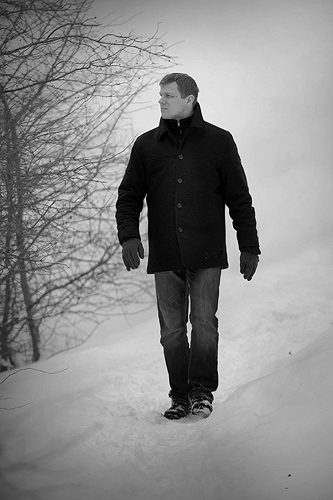Thoughts on “Whispers on the Prairie Wind”

Ēriks Ešenvalds
Ēriks Ešenvalds is one of the most sought-after choral composers working today. He has a busy commission schedule and we are thrilled to premiere the commission “Whispers on the Prairie Wind on February 26 and 27, 2015. This is a special event in collaboration with the Utah Symphony, Utah Symphony Chorus, and the University of Utah choirs for the American Choral Directors Association Conference.
Our artistic director, Barlow Bradford remembers their first conversation about the commission. “He asked me if I was OK with something secular and I said, ‘Sure!’ I’ve been such a fan of his choral writing that I felt the last thing he needed from me was restrictions. He needed to be free to do what he wanted to do.”
The piece has six movements, each telling a story about the prairie. “The poetry he found was really beautiful,” says Bradford. “He was interested in doing something about the prairie. He clearly understands this poetry, and I love how he tied movements 1 and 5 together.” The words illustrate a blissful calm, but then something comes in to destroy that peace. Those who hear the performance will no doubt be troubled as movement 5 ends tragically. But in the final movement there is, of course, a triumph.
Our remarkable pianist, Jared Pierce, is rehearsing these pieces with us and Barlow before the final rehearsals with the Utah Symphony and Thierry Fischer. “I love these pieces that Eric has written for us” says Pierce. “They tell an epic story of love, loss, and the triumph of the human spirit. Also, in them we find connections to the beauty of the earth, both spiritually and physically. The more we learn these stories, the more we realize that we have lived them.”
The singers experienced a roller coaster singing through these pieces for the first time, unaware of what stories they’d tell. One of our altos, Cami Talbot said, “I’m basically singing a Willa Cather novel; wildfires, blizzards, frozen schoolchildren and even a plucky maid.”
Alto Shauna Ruske said, “The beauty of the text really didn’t sink in until we were introduced to the 6th movement which is the least musical and the least poetic of all the movements. It is the original hymn written to honor a young heroine who saved the school children from freezing to death in a blizzard. Are the lyrics lovely? Not at all, but they are powerful and moving. This made the whole piece real for me. No longer was I not connecting to the seemingly over-simplified poetry. (The early settlers probably didn’t relate much to Shakespeare sonnets, anyway.) The music is joyful, sorrowful and depicts life of the prairie which is all about gratitude and survival.”
When Barlow Bradford played it through for the first time, he immediately thought it was a beautiful piece, but what he didn’t catch at first was how sensitive Ešenvalds was to the style of the writing. “The poem has a certain innocence to it that clearly has a universal depth,” he says. “I love how he moves this innocent line to this moment of the wind blowing, the trauma and that then transforms into the beauty and the triumph of the poetry.”
You don’t want to miss this performance! Ticket sales close on Saturday, so get yours today.
Thursday, February 26
Friday, February 27
8:00 PM
Abravanel Hall
BUY NOW


